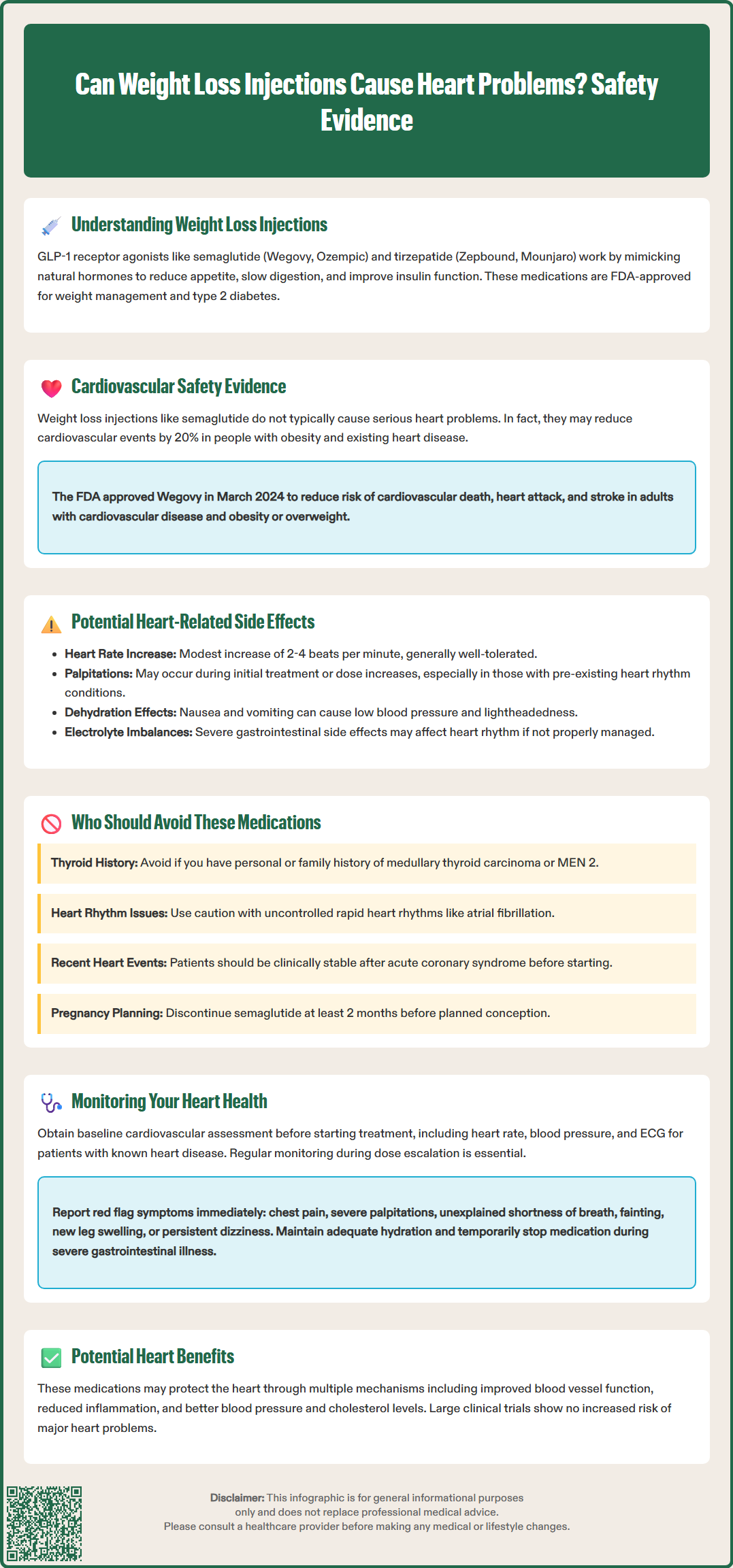LOSE WEIGHT WITH MEDICAL SUPPORT — BUILT FOR MEN
- Your personalised programme is built around medical care, not willpower.
- No generic diets. No guesswork.
- Just science-backed results and expert support.
Find out if you’re eligible

Weight loss injections, particularly GLP-1 receptor agonists like semaglutide (Wegovy, Ozempic) and tirzepatide (Zepbound, Mounjaro), have revolutionized obesity management, but questions about their cardiovascular safety remain a priority for patients and clinicians. Can weight loss injections cause heart problems? Current evidence suggests these medications generally do not cause serious cardiac issues in most patients and may actually reduce cardiovascular risk in specific populations. The FDA approved Wegovy in 2024 to reduce cardiovascular death, heart attack, and stroke risk in adults with established cardiovascular disease and obesity. However, individual responses vary, and understanding potential heart-related side effects, appropriate patient selection, and monitoring protocols is essential for safe, effective treatment.
Quick Answer: Weight loss injections typically do not cause serious heart problems and may reduce cardiovascular events in patients with established heart disease and obesity.
We offer compounded medications and Zepbound®. Compounded medications are prepared by licensed pharmacies and are not FDA-approved. References to Wegovy®, Ozempic®, Rybelsus®, Mounjaro®, or Saxenda®, or other GLP-1 brands, are informational only. Compounded and FDA-approved medications are not interchangeable.
Weight loss injections, particularly glucagon-like peptide-1 (GLP-1) receptor agonists such as semaglutide (Wegovy, Ozempic) and the dual glucose-dependent insulinotropic polypeptide (GIP)/GLP-1 receptor agonist tirzepatide (Zepbound, Mounjaro), have transformed obesity management in recent years. These incretin-based therapies work by mimicking naturally occurring hormones that regulate appetite, slow gastric emptying, and enhance insulin secretion. As their use has expanded, questions about cardiovascular safety have become increasingly important for both patients and clinicians.
It's important to note that Wegovy (semaglutide 2.4 mg) and Zepbound (tirzepatide) are FDA-approved for chronic weight management, while Ozempic (semaglutide) and Mounjaro (tirzepatide) are approved for type 2 diabetes management, though they may be used off-label for weight loss.
The relationship between weight loss injections and heart health is complex. Obesity itself is a major risk factor for cardiovascular disease, including coronary artery disease, heart failure, and arrhythmias. For diabetes medications, the FDA requires cardiovascular outcome trials following guidance established in 2008, though this requirement does not universally apply to all weight loss medications.
Current evidence suggests that these medications may provide cardiovascular benefits rather than harm for most patients. Large-scale clinical trials have demonstrated reductions in major adverse cardiovascular events (MACE) in certain patient populations. However, individual responses vary, and some heart-related side effects have been reported. Understanding both the potential benefits and risks is essential for making informed treatment decisions and ensuring appropriate patient selection and monitoring throughout therapy.

The short answer is that weight loss injections do not typically cause serious heart problems in most patients, and emerging evidence suggests they may actually protect against cardiovascular events in specific populations. However, like all medications, they can produce side effects that may affect the cardiovascular system in certain individuals.
The SELECT trial, published in 2023, demonstrated that semaglutide 2.4 mg (Wegovy) reduced the risk of major adverse cardiovascular events by 20% in patients with obesity and established cardiovascular disease but without diabetes. Based on these results, in March 2024, the FDA approved a new indication for Wegovy to reduce the risk of cardiovascular death, heart attack, and stroke in adults with cardiovascular disease and either obesity or overweight. For tirzepatide, cardiovascular outcome trial results are still pending.
In patients with type 2 diabetes, cardiovascular benefits have been observed with GLP-1 receptor agonists, including liraglutide in the LEADER trial and semaglutide in SUSTAIN-6. However, these findings in diabetes populations may not fully generalize to non-diabetic individuals using these medications solely for weight loss.
Regarding side effects, some individuals experience increased heart rate, which is a known effect of these medications. Clinical trials have documented modest heart rate increases averaging 2-4 beats per minute, though some patients may experience larger increases. While this is generally well-tolerated, it may be clinically significant in patients with certain pre-existing cardiac conditions. Additionally, severe gastrointestinal side effects can occasionally lead to dehydration and electrolyte imbalances, which may indirectly affect cardiac function.
These medications may benefit the heart through multiple mechanisms beyond weight loss alone. Researchers have proposed that GLP-1 receptors present in cardiac tissue may contribute to improved endothelial function, reduced inflammation, and favorable effects on blood pressure and lipid profiles, though these mechanisms remain hypothetical and require further investigation.
While serious cardiac adverse events are uncommon, several heart-related side effects have been documented with weight loss injections. Understanding these potential effects helps clinicians and patients recognize warning signs and respond appropriately.
Increased Heart Rate (Tachycardia) A modest increase in resting heart rate is consistently reported in clinical trials and FDA labeling. The average increase is typically 2-4 beats per minute above baseline, though some patients may experience greater increases. The exact mechanism for this heart rate increase is not fully established but may involve effects on autonomic regulation. Most patients do not notice this change, but those with pre-existing tachycardia or certain arrhythmias may experience palpitations or discomfort. Persistent tachycardia (heart rate consistently above 100 bpm at rest) warrants clinical evaluation.
Palpitations Some patients report awareness of their heartbeat or irregular heart rhythms, particularly during the initial weeks of treatment or after dose escalation. While often benign, palpitations can indicate underlying arrhythmias and should be evaluated, especially if accompanied by chest discomfort, shortness of breath, or dizziness.
Hypotension and Orthostatic Changes Dehydration from gastrointestinal side effects and reduced fluid intake (due to decreased appetite) can lead to volume depletion and low blood pressure. Patients may experience lightheadedness, particularly when standing quickly. This is especially relevant for individuals taking antihypertensive medications or those with chronic kidney disease, which may require dose adjustment of these medications.
Indirect Cardiac Effects Gastrointestinal side effects, particularly severe nausea, vomiting, and diarrhea, can lead to dehydration and electrolyte disturbances (hypokalemia, hypomagnesemia) that may affect cardiac rhythm. These effects are generally preventable with adequate hydration and electrolyte monitoring.
It's important to note that large cardiovascular outcome trials have not shown an increased risk of major adverse cardiovascular events or atrial fibrillation with these medications. While isolated case reports of atrial fibrillation and acute coronary syndrome exist in post-marketing surveillance, establishing causality is challenging, as the patient population using these medications often has multiple cardiovascular risk factors independent of treatment.
While weight loss injections are generally safe for most patients, certain individuals with specific cardiac conditions require careful evaluation before initiating therapy, and some may need to avoid these medications.
Absolute and Relative Contraindications
Patients with a personal or family history of medullary thyroid carcinoma or Multiple Endocrine Neoplasia syndrome type 2 (MEN 2) should not use GLP-1 receptor agonists due to thyroid C-cell tumor risk observed in animal studies. While not directly cardiac, this represents an important safety consideration.
Individuals with the following cardiac conditions should exercise caution and may require thorough cardiovascular assessment before treatment:
Uncontrolled tachyarrhythmias: Patients with poorly controlled atrial fibrillation, atrial flutter, or ventricular tachycardia may experience worsening symptoms due to the heart rate-increasing effects of these medications.
Recent acute coronary syndrome: Patients should be clinically stable before initiating therapy, and cardiology consultation may be appropriate for those with recent cardiovascular events.
Heart failure: While not contraindicated, patients with symptomatic heart failure require individualized assessment. Recent data suggest potential benefits in heart failure with preserved ejection fraction (HFpEF) with obesity, but monitoring is important, particularly during initiation.
Special Populations Requiring Enhanced Monitoring
Patients taking medications that affect heart rate (beta-blockers, calcium channel blockers, digoxin) may require monitoring for cumulative effects on heart rate, though significant pharmacokinetic interactions are uncommon with these agents.
Pregnancy Considerations
Pregnancy guidance varies by product. Wegovy (semaglutide 2.4 mg) and Saxenda (liraglutide 3.0 mg) are contraindicated during pregnancy according to their FDA labels. Zepbound (tirzepatide) is not recommended during pregnancy and should be discontinued when pregnancy is recognized. Women using tirzepatide who also take oral contraceptives should use a backup method for 4 weeks after initiation and dose escalations due to delayed gastric emptying. Women planning pregnancy should discontinue semaglutide at least 2 months before planned conception due to its long half-life.
Appropriate cardiovascular monitoring is essential for patients using weight loss injections to ensure early detection of potential cardiac side effects and optimize treatment safety.
Baseline Cardiovascular Assessment
Before initiating therapy, clinicians should obtain a comprehensive cardiovascular history, including previous cardiac events, arrhythmias, hypertension, and family history of premature cardiovascular disease. A baseline physical examination should include:
Resting heart rate and blood pressure (sitting and standing)
Cardiac auscultation to detect murmurs or irregular rhythms
Assessment for signs of heart failure (peripheral edema, jugular venous distension)
Baseline electrocardiogram (ECG) should be considered for patients with known cardiovascular disease, cardiac symptoms, or history of arrhythmias, rather than routinely for all patients over a certain age. Baseline laboratory studies should include electrolytes (sodium, potassium, magnesium), renal function, and hemoglobin A1c.
Ongoing Monitoring During Treatment
Patients should be monitored at intervals that align with dose escalation schedules and clinical needs:
During dose escalation: Assess for gastrointestinal side effects that may lead to dehydration, check blood pressure and heart rate, and evaluate tolerance.
Follow-up visits: Continue cardiovascular examination, including heart rate and blood pressure. Consider ECG if symptoms develop or if there is a sustained, clinically relevant increase in resting heart rate.
Regular follow-up: Comprehensive cardiovascular assessment, including review of any new cardiac symptoms, medication adjustments, and laboratory monitoring.
Consistent with FDA labeling, clinicians should consider discontinuation if a sustained, clinically relevant increase in resting heart rate occurs. For patients with diabetes who are also taking insulin or sulfonylureas, monitoring for hypoglycemia is essential, and dose adjustments of these medications may be necessary.
Patient Self-Monitoring and Red Flag Symptoms
Patients should be educated to recognize and report concerning symptoms promptly:
Chest pain or pressure, especially with exertion
Severe or persistent palpitations
Unexplained shortness of breath
Syncope (fainting) or near-syncope
New or worsening leg swelling
Persistent dizziness or lightheadedness
Home blood pressure and heart rate monitoring may be beneficial for patients with hypertension or those experiencing symptoms. Patients should maintain adequate hydration, especially during hot weather or illness, and should temporarily hold their medication during severe gastrointestinal illness to prevent volume depletion and acute kidney injury.
For patients with pre-existing cardiovascular disease, coordination with cardiology is advisable. The benefits of weight loss and potential cardiovascular protection must be balanced against individual risk factors, and treatment decisions should be personalized based on comprehensive cardiovascular assessment and ongoing monitoring.
No, weight loss injections like semaglutide (Wegovy) do not increase heart attack or stroke risk and may actually reduce these events by 20% in patients with established cardiovascular disease and obesity, according to the SELECT trial. The FDA approved Wegovy in 2024 specifically to reduce cardiovascular death, heart attack, and stroke risk in this population.
The most common heart-related side effect is a modest increase in resting heart rate, typically 2-4 beats per minute. Some patients may experience palpitations, and severe gastrointestinal side effects can lead to dehydration and low blood pressure, particularly when standing quickly.
Patients with uncontrolled tachyarrhythmias, recent acute coronary syndrome, or unstable heart conditions should exercise caution and require thorough cardiovascular assessment before starting treatment. Those with symptomatic heart failure need individualized evaluation, though these medications are not absolutely contraindicated in most cardiac conditions.
All medical content on this blog is created using reputable, evidence-based sources and is regularly reviewed for accuracy and relevance. While we strive to keep our content current with the latest research and clinical guidelines, it is intended for general informational purposes only.
This content is not a substitute for professional medical advice, diagnosis, or treatment. Always consult a licensed healthcare provider with any medical questions or concerns. Use of this information is at your own risk, and we are not liable for any outcomes resulting from its use.